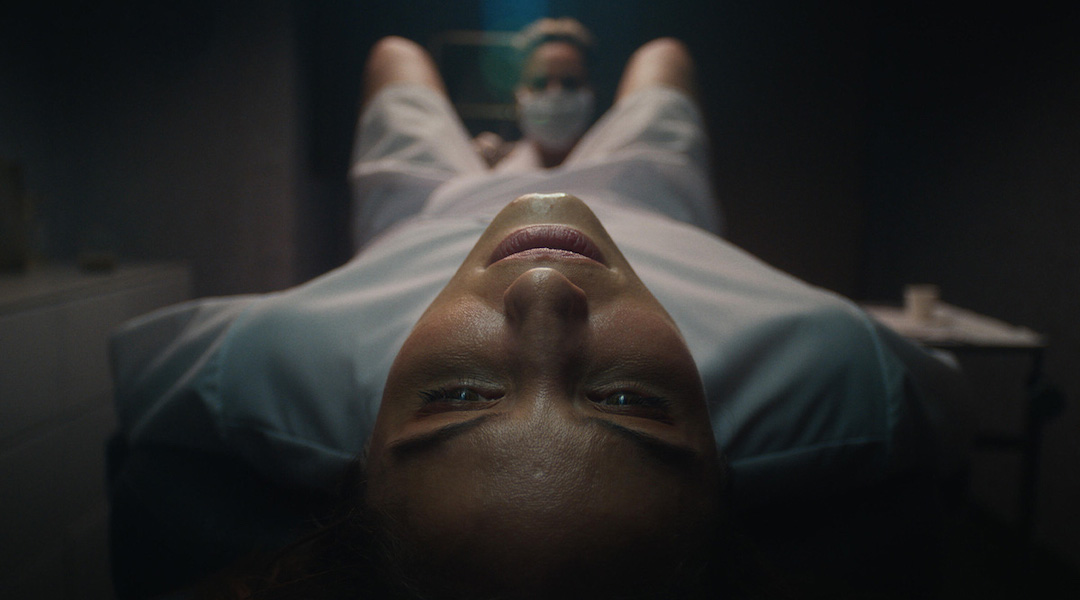A Hulu horror movie influenced by the post-Holocaust pressure to have children
‘Clock’ tackles the weighty topic of how the Jewish community can pressure women to bear children as a means of avenging the Holocaust

Dianna Agron stars in “Clock.” (Hulu)
A version of this article first appeared on Hey Alma.
As a science fiction horror film, Alexis Jacknow’s movie “Clock” is relatively unremarkable. Its images aren’t unique, and its narrative comes across as self-important. All of its attempted metaphors are spelled out by the director, leaving the audience with nothing to do except nod silently at its proclamations. As a result, I can understand why the film received negative reviews by audiences who wrote it off as nothing more than dull “propaganda.”
But audiences shouldn’t be so quick to dismiss Jacknow’s film, because there is something more horrifying in it than its images: its context.
The movie follows the story of an interior designer named Ella who, after being urged by her husband to go to a doctor for a breast cancer screening, ends up in a clinical trial that aims to fix the broken biological clocks of women who feel no desire to have children.
While for some, not having children is simply a choice, to others it is a radical statement — especially within the Jewish community, where there is intense pressure to procreate. In “Clock,” Ella’s choice to not have children is seen by her father to be a betrayal of her family’s past — especially to her grandmother, who survived the Holocaust. Beyond being a movie about a woman who doesn’t want kids, “Clock” is an exploration of the responsibility placed upon young Jewish women to avenge the wrongful deaths of our ancestors by bearing children.
Jacknow, who herself grew up Jewish in the Bible Belt, presents Ella as the quintessential assimilated, non-religious Jew. She serves caviar at Shabbat dinner, and in her wedding photos, she’s wearing a sari instead of standing under a chuppah. She embodies an in-between space that values Judaism’s customs and tradition without the burden of religious signifiers.
After arriving at the clinic, Ella undergoes a series of treatments aimed at fixing her biological clock. Dr. Simmons, the head of the clinical trial, explains to Ella that the single evolutionary goal of any species is to procreate; therefore, she says Ella’s biological system is mentally and physically off in a way that is similar to depression. During therapy, Dr. Simmons aims to get to the root of Ella’s dysfunction. Ella ends up talking about her family’s sole heirloom recovered after the war, a grandfather clock which she accidentally calls the “grandfather coffin” — and which represents the physical manifestation of Ella’s religious and familial betrayals.
Throughout the course of her treatment, Ella provides various reasons why she does not want children — one of them being the Holocaust. She says to Dr. Simmons that the Holocaust was the worst genocide because it happened between educated and cultured people, in a society that very much reflects the world today. Ella says she cannot in good conscience bring children into a world where the Holocaust could happen.
“Clock” is the latest in a long tradition of artworks that discuss the pressure or obligation some women feel to have children. “Alien” spearheaded the filmic discussion back in 1979, allegorizing motherhood and childbirth as life-ruining events. Outside of film, novels such as “Motherhood” by Sheila Heti and comedic memoirs like “I Can Barely Take Care of Myself: Tales From A Happy Life Without Kids” by Jen Kirkman address notions of procreation and motherhood in a less sinister manner. Despite their different tones and conclusions, they have all worked to de-stigmatize the conversation around procreation and allow women who choose not to have kids, or feel ambivalent about the decision, feel heard and understood.
Ultimately, Jacknow’s film can perhaps be seen as a cautionary tale against forcing women to have children, which could be an especially pertinent message to broadcast to the Jewish community. There is a widely held idea that the best revenge we can have for the Holocaust is our continued existence. After all, if we cease to have children, then what did we survive for? But by adopting this attitude and pressuring all Jewish women to bare children, we might simply be pushing them away.
This article originally appeared on JTA.org.





















